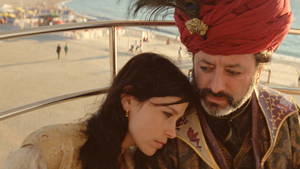Miguel Gomes’s The Arabian Nights: Volume 3, The Enchanted One (Gomes 2015), like the collection it takes its name from, tells a shimmering frame tale of loosely interwoven stories. The heroine, Xerazade (Crista Alfaiate), who has been telling the King stories in order to indefinitely forestall his bloodthirsty nature, leaves the palace that she has stayed in most of her life. Outside, she meets bandits, a spirit of the wind, and Paddleman (Carloto Cotta), father of many children, who is beautiful but dumb. She sings “Perfidia” on a rock overlooking the sea. She meets her father (Américo Silva), the vizier, on a Ferris wheel, and he tells her to go back to the palace, reassuring her of her ability. Gomes, in the outer narrative, seems to be channeling a distinctly Portuguese yet quirkily Wes Anderson style. Not having seen the first two films, I found Xerazade’s scenes fun yet seemingly light on substance.
The tale she tells, however, of chaffinch competitions and the men who catch and train them, was fascinating. A documentary within a fiction film, this section follows a group of men, mostly poor, who form a grassroots community of chaffinch catching, breeding, training, and competition. They compete to see whose bird can sing the best. Each man specializes: one focuses on breeding, another attempts to train his chaffinches by digitally creating the perfect song, and so on and so forth. Chapas (Chico Chapas), one of the oldest of the group, is the best trapper. He is a cornerstone of the community. The others cling to his sparse words. Yet he eventually moves away and is separated from the community he helped build. Chapas remarks that he doesn’t mind the move, as “all the good trappers are dead.” But this scene is immediately followed by another where, over a meal, we hear him say, “[the spuds] are good, but I’m not hungry.” His lack of appetite, juxtaposed with his assertion about the move, suggests that he regrets the move more than he is letting on. Who are we to believe, though, Chapas or the filmmaker who edits doubt into his assertion?
Partway through, the film segues into the tale of Hot Forest (Jing Jing Guo), a Chinese student who received a scholarship to study in Portugal. She falls in with the wrong crowd, lives with an older man for a time, and has a child with him before being dumped. We do not see any of these events, though, and there is no resolution to her account. Hot Forest’s voiceover tells the story over images of angry demonstrations and riots. It’s hard to say exactly how this piece fits into the film’s greater structure, but the politically active people it depicts provide a stark contrast with the poor chaffinch enthusiasts whose lives revolve around the competitions.
The film is infused with a sense of melancholy. One man, who keeps a store full of chaffinches, has all his birds stolen. Another man builds a large menagerie but leaves the door open one day. Not wanting to lose a competition, someone makes his bird continue to sing past the point of exhaustion, and it dies. I’m not sure who to feel sorry for, the men or the birds or both.
The subtitle to the film reads The Enchanted One, and I’m not sure who exactly it refers to, but I certainly felt enchanted watching the film. Slowly, its dreamy images and gentle pace worked its way into my mind and captivated me. I’m interested to re-watch this film and watch for the first time the other two volumes when they receive a home release. Perhaps my questions will be answered by the additional context, or perhaps, seen together, the films will raise only more questions. Either way, I’m ready to hear more of Xerazade and Gomes’s stories.
Author Biography
Adam Reece is a senior at Hendrix College majoring in English-Literary Studies. He recently received the “Kenneth Story Best Senior Thesis Award” for his work on Herman Melville’s Bartleby, the Scrivener, and will be graduating with distinction.
Mentor Biography
Kristi McKim is an Associate Professor of English and Chair of Film Studies at Hendrix College, where she was awarded the Charles S. and Lucile Esmon Shivley Odyssey Professorship, honored as the 2014-15 United Methodist Exemplary Professor, and nominated for the CASE U.S. Professors of the Year Award. Her publications include the books Love in the Time of Cinema (2011) and Cinema as Weather: Stylistic Screens and Atmospheric Change (2013), in addition to pieces in Camera Obscura, Studies in French Cinema, Senses of Cinema, Film International, The Cine-Files, and Film-Philosophy.
Department Overview
Hendrix College offers a major in English with an emphasis in Film Studies and a minor in Film Studies. This growing program within an intimate and rigorous liberal arts college environment includes a variety of courses in the history and theory of film and media, alongside co-curricular experiences (such as this trip to the New York Film Festival) generously made possible through the Hendrix-Odyssey Program. Extracurricular film-related groups include Hendrix Film Society and Hendrix Filmmakers.
Film Details
Arabian Nights: Volume 3, The Enchanted One (2015)
Portugal/France/Germany/Switzerland
Director Miguel Gomes
Runtime 125 minutes
Follow this link to read the introduction to this set of reviews: https://www.filmmattersmagazine.com/2016/05/21/2015-new-york-film-festival-introduction/









































